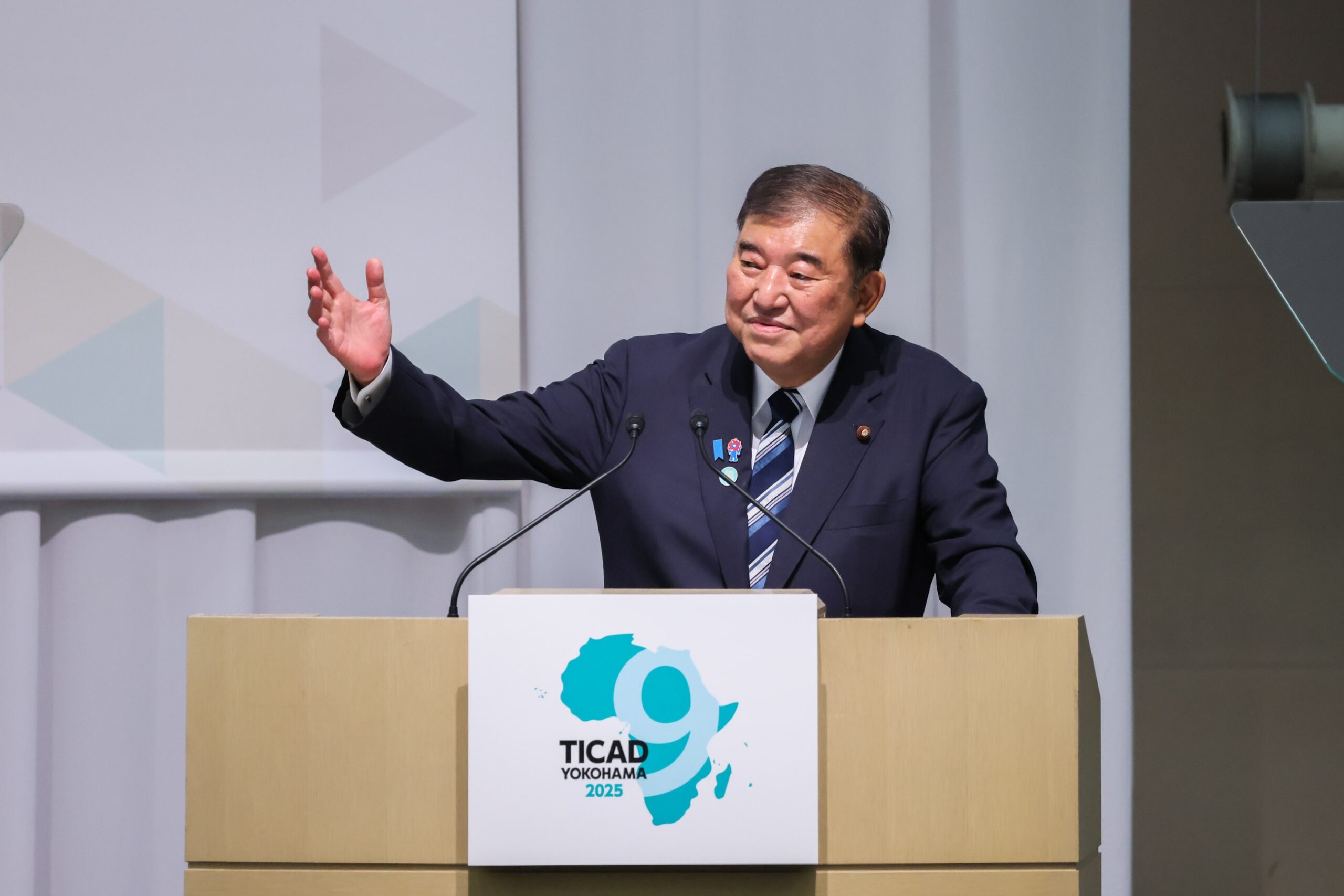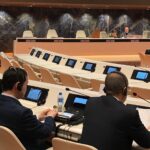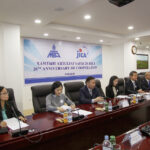The 9th Tokyo International Conference on African Development (TICAD 9) opened in Yokohama on August 20 with the theme “Co-create innovative solutions with Africa.” The Japanese government has led TICAD, which is co-hosted by the United Nations, the United Nations Development Programme (UNDP), the World Bank, and the African Union Commission (AUC), since its inception in 1993. TICAD 9 was attended by representatives from 49 African countries, including 33 heads of state and government. Representatives from international organizations, private companies, parliaments, and civil society also attended. Prime Minister Ishiba Shigeru served as co-chair and former Prime Minister Kishida Fumio served as acting co-chair. Over three days, discussions were held on the themes of “Peace and Stability,” “Economy,” and “Society.” The conference concluded on August 22 with the adoption of the TICAD 9 Yokohama Declaration (Table 1).
| Table 1: TICAD 9 Yokohama Declaration (Summary)
1. Overview
2. Specific Discussions (1) Economy
(2) Society
(3) Peace and Stability
(4) Future TICAD Process
Source: Ministry of Foreign Affairs of Japan |
During the opening of TICAD 9 on August 20, Prime Minister Ishiba mentioned that his involvement with Africa began in 2000. While serving as Senior Vice Minister of Agriculture, Forestry, and Fisheries, he traveled to Senegal in 2000 to discuss the opening of agricultural markets in the wake of the WTO’s launch. He called on the Senegalese Minister of Agriculture to cooperate on the WTO stage but was rejected outright. Although both countries face the common issue of low self-sufficiency, the Senegalese Minister of Agriculture noted that Japan has the financial means to purchase food from around the world, whereas Senegal lacks the financial resources to introduce agricultural technology and must purchase food from abroad. Prime Minister Ishiba said, “Understanding your counterpart, being attentive to their needs, and creating solutions together are important. Locally-rooted solutions are important for Africa’s development. This intense experience made me acutely aware of that. Indeed, that is precisely the theme of TICAD 9.”
Specifically, Prime Minister Ishiba highlighted three key areas in particular: sustainable growth led by the private sector, youth and women, and regional integration and connectivity, both within and beyond the region. He expressed Japan’s commitment to working with Africa to address global challenges (Table 2).
Table 2: Initiatives Raised by Prime Minister Ishiba
Source: Ministry of Foreign Affairs of Japan |
After Prime Minister Ishiba spoke, Co-chair President Lourenço of Angola (Chairperson of the African Union) delivered a keynote address. He emphasized the importance of mechanisms to facilitate financing necessary for addressing Africa’s development challenges, such as health, education, food security, energy infrastructure development, trade, and digitalization. He also discussed the importance of peace and stability, and UN Security Council reform.
During Plenary Session 1, which was themed “Peace and Stability,” the importance of peace and stability as prerequisites for development and prosperity was confirmed. Issues discussed included Africa’s own solutions, strengthening regional organizations, the roles of youth and women, conflict prevention, and the importance of UN Security Council reform.
During Plenary Session 2 (Economy), Japan presented its future-oriented investments through public-private collaboration, along with its commitment to economic diversification and regional integration. African representatives pointed out challenges to achieving this, such as industrial development including the utilization of mineral resources, economic diversification, good governance including the development of legal systems, infrastructure development, intra-regional trade and strengthening of value chains through the African Continental Free Trade Area, digitalization, investment in people through education and human resource development, debt issues, appropriate financing, and improved energy access. They discussed green and blue economies, and the use of advanced technologies like AI to solve challenges. They also expressed expectations for more Japanese investment in Africa and stronger partnerships, emphasizing the importance of sustainable, trust-based relationships.
During Plenary Session 3 (Society), Japan presented its future initiatives in education, human resource development, health, the environment, and disaster risk reduction.
Throughout the event, a wide range of discussions were held on issues such as investing in people, empowering youth and women, strengthening health systems, water and sanitation, climate change countermeasures, and disaster prevention measures, all with a view to realizing the SDGs and Agenda 2063 (which was formulated in 2013, half a century after the founding of the Organisation of African Unity (OAU), the predecessor to the African Union, as a set of unified goals for Africa to achieve over the next 50 years).
TICAD 9 concluded on August 22 with the adoption of the Yokohama Declaration, which reaffirmed the importance of the multilateral trading system amid protectionist trends. The declaration emphasized the “co-creation” of solutions to Africa’s challenges, such as improving debt transparency, based on the three pillars of “Peace and Stability,” “Economy,” and “Society.” This was an attempt to distinguish Japan from China, whose influence in the region is growing. In particular, it emphasized that democracy and the rule of law are the foundations of sustainable development in Africa, and clearly stated its intention to strengthen connectivity between Africa and the Indo-Pacific region, with Prime Minister Ishiba’s new initiative, the “Economic Region Initiative of Indian Ocean-Africa,” in mind (Table 3).
| Table 3: Economic Region Initiative of Indian Ocean-Africa
◆At TICAD 9, we proposed an initiative to collaborate with Indian Ocean countries, such as India and the Middle East, in the Indian Ocean-African economic zone, which is the center of global economic growth, to contribute to Africa’s regional integration and industrial development. ◆Positioned as part of the “Free and Open Indo-Pacific (FOIP)” vision, we aim to strengthen ties with Africa and other countries in the Global South, support Japanese companies seeking to expand trade and investment with Africa from Indian Ocean countries, and encourage them to return to Japan. 1. Background and Awareness of the Issues Indian Ocean countries and Africa share historical ties. The region west of India has the potential to become a center of global economic growth, driven by population growth. Several Japanese companies are expanding into Africa from India and the Middle East, and interest in the region is also growing (the “Japan-India-Africa Public-Private Forum,” sponsored by the Ministry of Economy, Trade and Industry and the Nikkei Shimbun, was held in February 2025). 2. Specific Content We aim to strengthen regional connectivity and build a free and fair economic zone. To achieve this, we will strategically and organically combine Japan’s policy tools and advance them across a broad range of fields. We will also promote collaboration with like-minded countries such as the G7 and international organizations. (1) Strengthening Cooperation with Indian Ocean Countries
(2) Strengthening Connectivity in the Indian Ocean-African Economic Zone
(3) Developing Regional Industries and Creating Jobs Based on Co-creation and Collaboration
Source: Ministry of Foreign Affairs of Japan |
Keeping the US tariff issue in mind, the declaration emphasized, “We reaffirm the importance of the rules-based and open multilateral trading system with the World Trade Organization (WTO) at its core.” It also stated, “We will cooperate toward the success of the 14th WTO Ministerial Conference in Cameroon [in 2026].”
During TICAD 9, Prime Minister Ishiba met with heads of state from 34 countries and international organizations.
“I didn’t come here [Africa] to teach. I came here to learn.”
At the conclusion of TICAD 9, Prime Minister Ishiba said, “These are the words of Dr. Noguchi Hideyo (1876–1928), who conducted research on yellow fever in Ghana, as I mentioned at the opening ceremony. As TICAD 9 comes to a close, I am deeply moved by the meaning of these words. Through frank exchanges with many African leaders, I myself have learned a great deal. I would like to utilize this for the benefit of Africa and the rest of the world.”

“Japan will work alongside the people of Africa, laughing, crying and working hard, to overcome every challenge facing the continent. It is not only for Africa, not for Japan, but for the world,” said Prime Minister Ishiba at the closing ceremony of TICAD 9. Ishiba expressed his hope that this meeting would mark a new starting point for strengthening Japan’s relations with Africa and make a leap forward for the continent, building a new, even stronger partnership between Japan and Africa. PHOTO: CABINET PUBLIC AFFAIRS OFFICE
At a joint press conference following the close of the conference, Prime Minister Ishiba emphasized Japan’s commitment to expanding investment in Africa’s future, strengthening industrial cooperation, and developing human resources. He stated that the new initiative aims to promote Africa’s regional integration and industrial development alongside countries surrounding the Indian Ocean. He continued, “The international community is becoming increasingly divided, and the international order is under significant pressure. Can we transform these challenges into opportunities for prosperity? It is an investment in Africa’s future, a collaborative effort to solve problems on the ground, and a step-by-step process of nurturing each and every individual. I believe that TICAD 9 served as an important opportunity to confirm these points with our African partners and to define cooperation between Japan and Africa over the next 30 years.”
Approximately 200 companies participated in the TICAD Business Expo & Conference (TBEC), a record high for the event, which is hosted by the Japan External Trade Organization (JETRO). During TICAD 9, the number of memorandums of understanding (MOUs) between the Japanese government and companies collaborating with local governments and other organizations exceeded 300, up from 92 at TICAD 8.
Rich in resources, Africa has been called “Earth’s final frontier,” and the race for development has intensified, especially in this century. Needless to say, it is desirable to see “co-creation” in various fields in Africa, rather than one-sided support.
Mizuno Tetsu is a freelance journalist.








